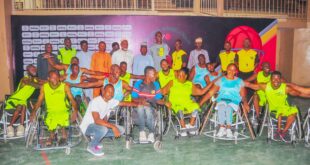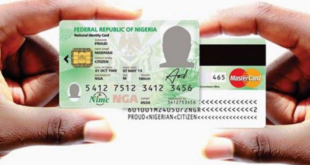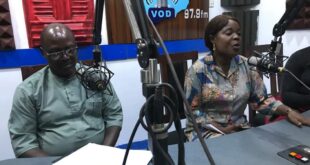By Olanrewaju Akojede, News Agency of Nigeria (NAN)
When President Muhammadu Buhari mounted the saddle in 1915, many Nigerians believed he had the magic wand to turnaround the country’s fortunes in sports.
The weight of expectations fell on Buhari’s first Minister of Sports, Solomon Dalung, to engineer the desired turnaround.
Credit must be given to the Plateau-born minister who supervised the qualification of the Super Eagles to the Russia 2018 World Cup, after eight years of non appearance at the global football fiesta.
Dalung had in 2017 started the resuscitation of the Olympic-size swimming pool at the National Stadium, Surulere, Lagos, that had been abandoned for 20 years, under a Public Private Partnership (PPP) initiative.
The plan was later aborted, when the former Governor of Lagos State, Akinwunmi Ambode, put in a bid to take over the administration of the stadium.
Under Dalung, Nigeria’s Women’s basketball team also won the AfroBasket championship in Mali, while both the male and female teams were ranked among the top three in Africa for the first time in the history of basketball in Nigeria.
In 2018, Dalung created a Youth Development Financing Trademark (BBSF) as well as Brands and Business targeted at youths, to facilitate the creation of 100,000 jobs through a scheme tagged Transformation Enterprises in two years.
The programme also facilitated the establishment of 109 Youth Business Clusters, one in each Senatorial District and FCT by 2019.
The last days of Dalung’s reign were, however, controversial due mainly to his alleged overbearing influence on sports federations.
In fact, elections into various federations’ executives and board positions were marred by allegations of imposition, especially the polarisation of Basketball Federation, which threw up Musa Kida and Tijani Umar in June 12 and 13, 2017, as factional chairmen.
Perhaps, based on the allegations, President Buhari did not reappoint Dalung in his second tenure, bringing on board Sunday Dare as Nigeria’s 35th minister of sports and youth development in 2019.
Dare was faced with the task of uplifting the standard he met on ground. He confronted the problems of the sector headlong.
His first challenge was the paltry allocation to sports in the 2020 budget, a meagre N1.4 billion; the amount was hardly enough, hence he opted for the PPP approach.
He subsequently enlisted the support of sports-loving Nigerians to join him to rescue sports from its near-comatose state.
Dare provided a template for the revival of Ahmadu Bello Stadium, Kaduna, National Stadium (Now MKO Abiola Stadium), Abuja, Liberty Stadium, (Obafemi Awolowo), National Stadium, Surulere and Katsina Township Stadium.
The minister promised that he would not only rehabilitate the long-neglected facilities, but would also look for innovative ways to generate funds to maintain them.
Under his Adopt-a-Pitch initiative, Dare got Dangote Industries Ltd. (DIL) to adopt the main pitch of the Moshood Abiola National Stadium, Abuja.
After the rehabilitation of the stadium by Dangote, it was used for the first time in a decade for Super Eagles World Cup qualification match against Ghana, which Nigeria eventually lost.
Under the same scheme, Sir Kesington Adebutu adopted the main pitch of the Daura Township Stadium.
Adebutu, again, came to the rescue to facilitate the refurbishment of the pitch, scoreboard and tartan tracks of the National Stadium, Surulere.
The minister also created another scheme tagged “Adopt an Athlete Campaign,” a scheme that ensured that Nigeria could prepare for Olympics events early in sports in which the country had comparative advantage.
Dare was known to have boosted the morale of the Nigerian athletes by paying outstanding allowances of athletes and coaches who represented Nigeria in international and continental competitions but were owed for three years.
Dare also sought for funds to settle Nigeria’s debt to the World Athletics formerly International Association of Athletics Federations (IAAF).
In 2017, the IAAF had mistakenly remitted 150,000 dollars to AFN, instead of 15,000 dollars, as its financial obligation to all member federations.
Upon the discovery of the error, it requested a refund of 135, 000 dollars, which had not been accounted for. Dalung paid part of the money, leaving a balance of 65,000 dollars.
This situation angered the IAAF, which threatened to ban Nigeria from all its competitions if the money was not refunded within the stipulated time. Dare took the bull by the horn and settled the debt.
Althouh Dare’s giant strides in sports are well documented, some stakeholders believe there are some grey areas that blighted his performance.
Like Dalung, Dare was accused of interference with the running of sports federations, as some federations became factionalised, especially basketball, which resulted in the banning of the national teams from international competitions before they were later restored.
Also, Dare was unable to resolve the riddle behind the abandonment of National Stadium, Surulere, with the latest casualty – the crashing of floodlights due to many years of neglect.
After many promises, Dare missed the chance to restore the lost glory of the national monument.
Under Dare’s watch Nigeria failed to qualify for yet another World Cup in Dubai 2022.
Indeed, the former Director General of defunct National Sports Commission (NSC), Alhassan Yakmut, said sports under President Buhari’s administration had its merit and shortcomings.
“Interestingly, the administration of Buhari came when we were having things good in sports, starting with the victory of the Nigerian contingent to the All Africa Games in Congo Brazzaville when Nigeria came second in 2015.
“Nigeria also had other good times in sports such as basketball with our male and female teams, D’Tigers and D’Tigress, that were doing well, and our male soccer team as well.
“However, the painful thing about the administration is that it was deficient in sports development and technical supervision.
“This is because the National Sports Commission did not exist to supervise the development of the athletes that were discovered by the previous administration,” Yakmut told NAN.
Yakmut, a member of the Board of the Nigeria Volleyball Federation, however, commended the Buhari administration for its sports policy initiative.
“The area the administration had an upper hand is that it came up with a policy to make sports a business rather than a recreational activity.
“Again, there are no technical structures to connect to see to its implementation. The implementation part should also be an ingredient in the policy,” he said.
A veteran journalist, Segun Olanipekun, contended that the Buhari administration had performed below average.
“The administration could have performed better but failed to. They came with lots of promises to impact sports but did not fulfill those promises.
“The goodwill that the administration had at inception should have been sustained, but the minister of sports is too encumbered with politics rather than the administration of sports itself.
“I was expecting the minister to have done well in the sports facilities and revamp the abandoned sporting infrastructure, but sadly only one has been put to use,” he said.
There is, indeed, no shortage of encomiums for the Buhari administration in sports, but many Nigerians believe he has left a legacy of failure to qualify for major sporting events, dilapidated infrastructure and wrangling in many sports federations.
(NAN)
Subscribe to the Advocate News letter and receive news updates daily in your inbox.
 Advocate.ng Latest news update on politics, entertainment, sport and more
Advocate.ng Latest news update on politics, entertainment, sport and more




